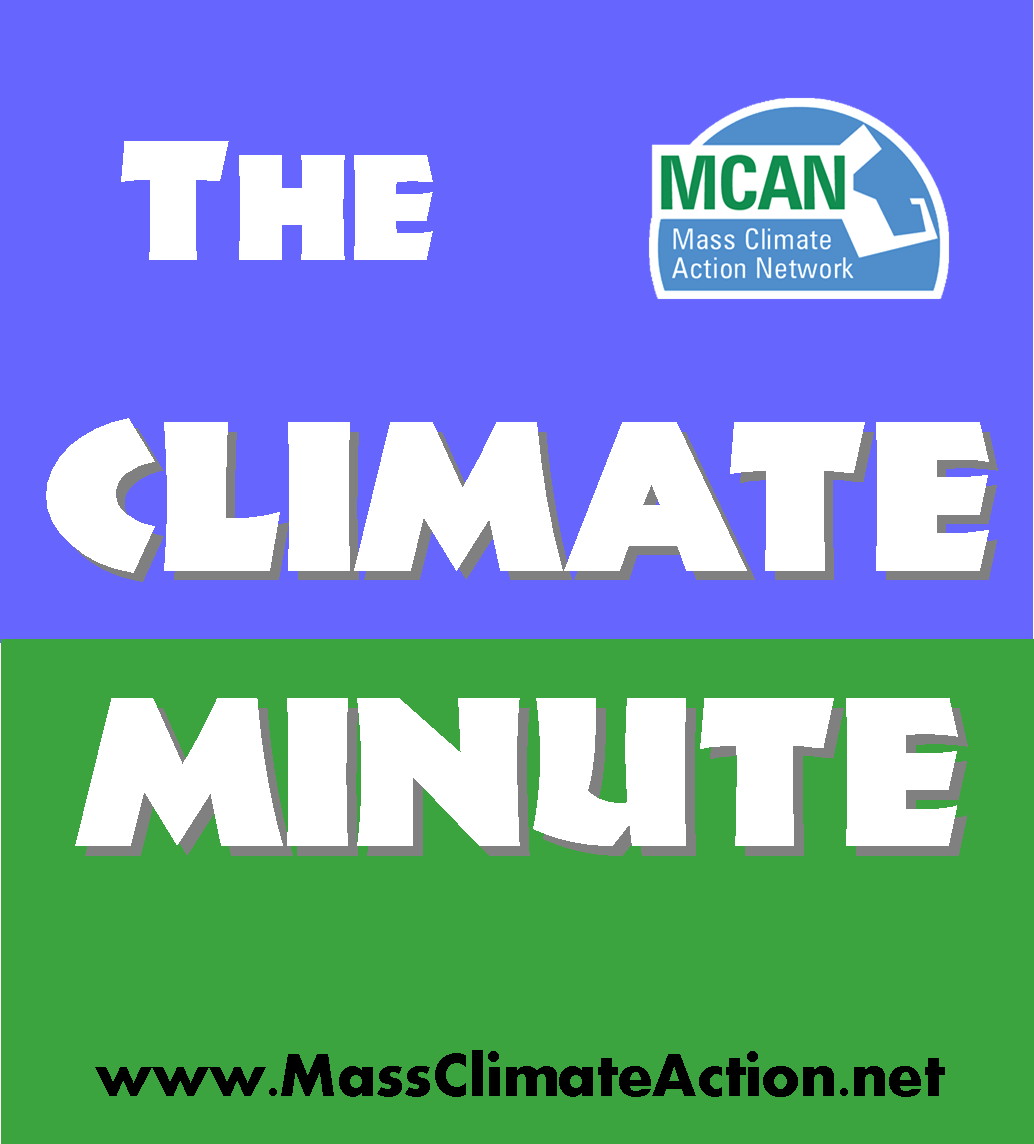

The Climate Minute
The Climate Minute - IPCC leaks, safe cars, and Barack Obama: number one coal dealer.
2013-08-23
Good morning, and welcome to the Climate Minute for August 23rd, 2013. Rob and Ted come at you "live" from the Pink and Orange coffeehouse talking about the latest leaks about the next IPCC report, whither sunspots, and is it even worth talking to deniers?
We start this week talking about the recent spate of leaks of the latest version of the IPCC 5th Assessment Report. The report is notable in that it ups the degree of certainty it reports that human activities are contributing to climate ...
Good morning, and welcome to the Climate Minute for August 23rd, 2013. Rob and Ted come at you "live" from the Pink and Orange coffeehouse talking about the latest leaks about the next IPCC report, whither sunspots, and is it even worth talking to deniers?
We start this week talking about the recent spate of leaks of the latest version of the IPCC 5th Assessment Report. The report is notable in that it ups the degree of certainty it reports that human activities are contributing to climate change, from 90% in the last (2007) assessment, to 95%. That link is to a ThinkProgress piece that highlights several troubling aspects of the report.
For the short attention span types (like me), here's a Washington Post story with "Ten Nuggets Worth Knowing" about the leaked report.
Of course as a former college professor of mine loved to say, where you stand depends upon where you sit, and the skeptic community was over-the-moon pulling isolated parts of the report out of context. For those with strong stomaches and advanced BS-meters, here's Watt's Up With That?'s take on the report.
One of the things the tinfoil hat bridge (I'm sorry, feeling particularly snarky today...) likes to tout is the impact of change in solar output effects climate. Okay, first: duh. The sun has a large impact on our environment. But even if you want to by in to the "solar minimum" argument that we are entering an extended solar minimum (a period with few sunspots), at best that *temporary* solar change will only serve to give a brief respite from even higher temperatures.
Some folks were even trotting out a recent study that we could be entering a new "Grand Solar Minimum" period like that which coincided with the "little ice age" of the 17th and 18th century. Facts however must intrude; even those doing the study suggest that the impact of a solar minimum, even a grand one, could mean little more than .3 degree of cooling. And again, it would be temporary -- unlike the CO2 we're pumping into the atmosphere which could be there for centuries.
We talked a bit about the futility or necessity to spread the climate message to non-believers, the skeptics. Dave Roberts expresses his frustration with attempts to reach out to the right here, and feels that maybe it's just reached the point where some folks are just about unreachable. Ted is very sympathetic to this position. Rob, however, is ever the optimist and falls in line with HuffPost's Kate Sheppard, and thinks that you can still talk to deniers, you just need to find that common ground, and maybe that means not using the "c" word.
(And here's Dave Roberts' post on what is a "Climate Hawk.") We wish Dave all the best on his sabbatical, and look forward to an energized and rested Mr. Roberts when he comes back.
While talking about values, this MIT Technology Review piece about the moral responsibility to act on climate change, and how a positive narrative can make a huge difference in advocacy.
Now. Dealing with deniers is one thing, what do you do with the people who believe as you do, who do the "wrong" thing?
Exhibit A: The Bureau of Land Management is about to auction off up to 316 tons of coal under public lands in Wyoming's Powder River Basin. As it turns out, 42 percent of all coal mined in this country comes from public lands. How does this square with the President's speech back in June?
Exhibit B: BLM is also finalizing regulations to regulate fracking on public lands. Never mind how tough the regs are (and, as usual, industry is howling); should this administration which has declared war on climate change allow fracking at all?
For a scintillating read about the "flow battery" and its potential as a utility-scale battery, read Electrical Engineering Times' piece here.
(And if Ted the nuclear physicist doesn't really understand how this battery works, you can imagine how Rob the political science major's head exploded trying to read the piece...)
[caption id="attachment_3496" align="alignright" width="377"] But Honey, it's safer than a Volvo![/caption]
View more
Thanks to the good folks at Tesla, they've just given me a little more ammunition in my efforts to have my spouse let me get a nifty Tesla S. The model S has just scored the highest score every on crash safety testing!
There are a couple of interesting things coming up next week in the area.
First, Iowa State Senator is doing a book tour supporting his new book, “America’s Climate Century,” and will be in Brookline the evening of the 26th. Here’s our calendar entry with all of his New England stops. Remember, for climate activities near you check out our MCAN climate action calendar. You can enter events as well as browse for interesting things to do. We’re just a week and a half away from the Energy Exodus march from coal (Brayton) to wind (the shores of Cape Cod). The march will start on August 28th and go through the weekend to September 2nd and will cover about 60 miles across southcoast Massachusetts. Walkers will be doing 10-12 miles a day, with stops along the way. For more info and to sign-up go to their website here. As always, it’s been a pleasure sharing climate news and views with you. You know, you can subscribe to our iTunes feed and get our podcasts automatically here. Feel free to give us your thoughts on our Facebook page, or through old-fashioned email. You can even follow us on twitter @MassClimate , so there are lots of ways for you to listen and participate in the dialog. When you are on the website, please contribute to MCAN. Every dollar you give will be doubled by a generous backer, so long we reach our fundraising goal. We’re three quarters of the way there, can you help? So we will close the way we always close, by saying that because we recognize the necessity of personal accountability for our actions, because we accept responsibility for building a durable future and because we believe it is a patriotic duty as citizens, we insist that the US put a price on carbon. Good bye and see you next week…Comments (3)
More Episodes
All Episodes>>Creat Yourt Podcast In Minutes
- Full-featured podcast site
- Unlimited storage and bandwidth
- Comprehensive podcast stats
- Distribute to Apple Podcasts, Spotify, and more
- Make money with your podcast
It is Free












